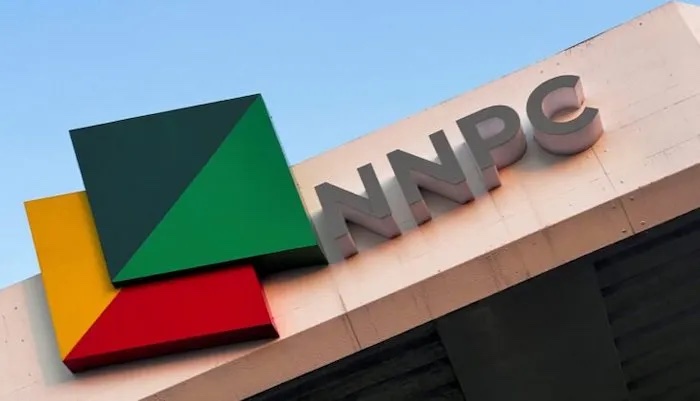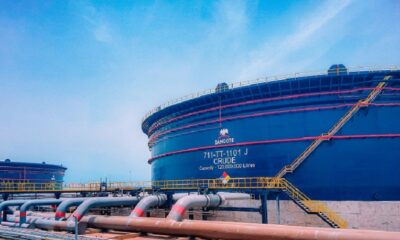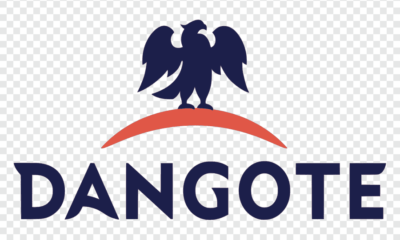Business
BREAKING: Dangote Issue Shocking, Creating Bad Waves For Nigeria Globally – Adesina

The reputational damage being inflicted on Nigeria by the mismanagement of issues around the Dangote Refinery has caught the attention of the President of the African Development Bank, Adesina Akinwunmi.
In a strong statement shared by business mogul, Femi Otedola on Tuesday via X, Adesina decried what has befallen Nigeria as a result of negative vibes.
He maintained that those desire to compete with the Dangote Refinery should “set up local refineries and compete by refining in Nigeria. That is fair and justified competition.”
ALSO READ: BREAKING: Kyari Declares He Has No Conflicting Business Interests With Dangote
According to Adesina, “Monopoly often exists where there are high barriers to entry or high capital costs.
“How many individuals or companies can do railways?
“How many can do refineries of the scale of Dangote Refineries?
“In a nation that has been importing refined petroleum products for several decades, the abnormal simply became very normal.
“No smart investor would make a $19.5 billion investment and want it to be undermined by importers.
“To manufacture is extremely expensive and risky. This is even more so in Nigeria, given the very challenging business and economic environment, fraught with policy uncertainties and policy reversals, and where the self-defeating default mode of “simply import it” is always so easily rationalized and chorused to solve any problem.
“Competition is good for everyone. But is Dangote refineries anti-competitive? What is the evidence?
“Has Dangote refineries prevented any other company from setting up refineries?
“Why have others not done so? How come they have not done so for several decades? Was it Dangote that held them back?
“But Dangote refineries surely cannot be asked to ‘compete’ with importers of petroleum products.
“That is not competition.
“Let the importers set up local refineries and compete by refining in Nigeria. That is fair and justified competition.
“We cannot and must not undermine, disparage or kill local industries, talk less of one that is of this scale — a jewel of industrialisation in Nigeria.
“It is more than simply delivering the cheapest product to the market. It is about domestic supply security, driving (and yes, protecting) globally competitive industries, maximizing forward and backward linkages in the local economy, job creation, reducing forex expenses and shoring up the Naira.
“We must not be myopic.
“This whole disparaging of Dangote is uncalled for. It is self-defeating. And it is very bad for Nigeria. Who will want to come and invest in a country that disparages and undermines its own largest investor?
“Investing is tough. Pettiness is easy.
“It sadly sends a signal that the price for sacrificing for Nigeria is to get sacrificed.”
Business
World Bank Appoints Aliko Dangote To Elite Group

The President and Chief Executive of the Dangote Group, Alh Aliko Dangote, has been appointed to the World Bank’s Private Sector Investment Lab.
Biztellers reports that his see the business mogul joining a select group of global business leaders tasked with driving investment and job creation in emerging economies.
The development was revealed in a statement in which he confirmed his acceptance, where the African industrialist reaffirmed his commitment to fostering sustainable economic growth through private sector-led investment, noting the transformative potential of such initiatives in developing markets.
“I am both honoured and excited to accept my appointment to the World Bank’s Private Sector Investment Lab, dedicated to advancing investment and employment in emerging economies,” Dangote said.
ALSO READ: Ministry Appoints New Director For DUFUTH, Uburu
“This opportunity aligns with my long-standing commitment to sustainable development and unlocking the potential of developing economies. Drawing inspiration from the remarkable successes of the Asian Tigers, which have demonstrated the power of strategic investment and focused economic policy, I am eager to collaborate with fellow leaders to replicate such outcomes across other regions.”
The Dangote Group, founded by Aliko Dangote, is the largest conglomerate in West Africa and one of the largest on the African continent. With interests spanning cement, fertiliser, salt, sugar, and oil, the Group employs over 30,000 people and is the largest taxpayer in Nigeria—contributing more in taxes than all of Nigeria’s banks combined. It is also the country’s largest employer after the government.
The $20 billion Dangote Petroleum Refinery & Petrochemicals, the Group’s flagship project, stands as the largest single private investment in Africa.
In addition to his business interests, Dangote leads the Aliko Dangote Foundation (ADF), the largest private foundation in sub-Saharan Africa, with the largest endowment by a single African donor. The Foundation primarily focuses on child nutrition, while also supporting interventions in health, education, empowerment, and disaster relief.
The World Bank announced Dangote’s appointment on Wednesday as part of a broader expansion of its Private Sector Investment Lab, which now enters a new phase aimed at scaling up solutions to attract private capital and create jobs in the developing world.
Joining Dangote in the elite group are Bill Anderson, CEO of Bayer AG; Sunil Bharti Mittal, Chair of Bharti Enterprises; and Mark Hoplamazian, President and CEO of Hyatt Hotels Corporation.
The World Bank said the expanded membership brings together business leaders with proven track records in generating employment in developing economies—supporting the Bank’s sharpened focus on job creation as a central pillar of global development.
“With the expanded membership, we are mainstreaming this work across our operations and tying it directly to the jobs agenda that is driving our strategy,” said World Bank Group President Ajay Banga. “This isn’t about altruism—it’s about helping the private sector see a path to investments that will deliver returns, and lift people and economies alike. It’s central to our mandate.”
The global bank said that over the last 18 months, the Lab brought together leaders from global financial institutions to identify the most pressing barriers to private sector investment in developing countries and to test actionable solutions.
The statement said that the work had now been consolidated into five priority focus areas that were being integrated across the bank operations, including regulatory and policy certainty.
The Lab’s founding members included senior executives from AXA, BlackRock, HSBC, Macquarie, Mitsubishi UFJ Financial Group, Ninety-One, Ping An Group, Royal Philips, Standard Bank, Standard Chartered, Sustainable Energy for All, Tata Sons, Temasek, and Three Cairns Group. The Lab is chaired by Shriti Vadera, Chair of Prudential plc.
Business
Trade Tensions Hit Nokia As Q1 Ends In €68M Loss
Nokia has reported a net loss of €68 million for the first quarter of 2025, a sharp decline from the €438 million profit recorded during the same period last year.
The Finnish telecoms equipment maker attributed the downturn to global trade disruptions and recently imposed tariffs by the United States.
The company’s net sales dropped slightly to €4.4 billion, down by one percent year-on-year.
READ ALSO: Trade War: China Strikes Back Wth 125% Tariffs On U.S. Goods
Tariff-related challenges were highlighted by Nokia’s President and CEO, Justin Hotard, who acknowledged the broader economic pressures affecting the industry.
“We are not immune to the rapidly evolving global trade landscape,” Hotard stated. “However, based on early customer feedback, I believe our markets should prove to be relatively resilient.”
He also noted the potential short-term financial impact, saying, “Based on what we see today, we currently expect a EUR 20 to 30 million impact on our comparable operating profit in the second quarter from the current tariffs.”
Earlier this month, U.S. President Donald Trump introduced a 10 percent tariff on global imports, while pausing plans for steeper duties, including a proposed 20 percent levy on products from the European Union.
Despite the quarterly setback, Nokia expressed confidence in its growth prospects.
The company is looking to its Network Infrastructure, Cloud and Network Services, and Mobile Networks divisions to drive sales in the year ahead.
In a sign of continued momentum in the mobile segment, Nokia also announced on Thursday that it had extended its contract with T-Mobile US.
The company said it is continuing “to see positive signs of stabilization” in Mobile Networks.
Business
Marketers In Anguish, As Dangote, NNPC Ltd War Drag Price To N880/litre

The pull of market forces which moved the hands of the Nigerian National Petroleum Company Limited (NNPC Ltd) to reduce the price of Premium Motor Spirit (petrol) to N880 per litre in Lagos and N935 in Abuja appears to be a source of torture to independent markets.
Biztellers reports that the latest price review on Easter Monday saw NNPC retail outlets in Lagos drop from N925 to N880, while those in Abuja adjusted from N950 to N935.
The NNPC Ltd’s price reduction came barely a week after the Dangote Refinery lowered its ex-depot price from N865 to N835 per litre.
ALSO READ: BREAKING: Again, Dangote Cuts Petrol Price To N835 per Litre
In addition, the $20bn refinery also directed its partners like MRS, Heyden, and Ardova to sell a litre of petrol at the rate of N890 instead of N920 in Lagos, N900 in the South West, N910 in the South-South, and N920 in the North East.
Consumers can smile because with the reaction, the NNPC Ltd’s new price in Lagos is N10 lower than what the Dangote Refinery is selling at, which might lead to another reaction, as the price war between the two companies.
Though some NNPC Ltd’s retail outlets were observed selling at the old rate in Lagos, it was gathered that they were given the liberty to exhaust old stock before adjusting to the new prices.
Market sources are of the view that the current price war was ignited by the Federal Government’s implementation of the Naira-for-crude policy.

















